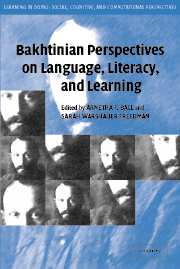Book contents
- Frontmatter
- Contents
- List of Contributors
- Acknowledgments
- PART I IDEOLOGIES IN DIALOGUE: THEORETICAL CONSIDERATIONS
- 1 Ideological Becoming: Bakhtinian Concepts to Guide the Study of Language, Literacy, and Learning
- 2 Dewey and Bakhtin in Dialogue: From Rosenblatt to a Pedagogy of Literature as Social, Aesthetic Practice
- 3 Intertextualities: Volosinov, Bakhtin, Literary Theory, and Literacy Studies
- 4 The Teaching of Academic Language to Minority Second Language Learners
- Voices in Dialogue – Dialoguing About Dialogism: Form and Content in a Bakhtinian Dialogue
- PART II VOICED, DOUBLE VOICED, AND MULTIVOICED DISCOURSES IN OUR SCHOOLS
- PART III HETEROGLOSSIA IN A CHANGING WORLD
- PART IV A CLOSING THOUGHT ON BAKHTINIAN PERSPECTIVES
- Author Index
- Subject Index
- Titles in the series
- References
2 - Dewey and Bakhtin in Dialogue: From Rosenblatt to a Pedagogy of Literature as Social, Aesthetic Practice
Published online by Cambridge University Press: 24 May 2010
- Frontmatter
- Contents
- List of Contributors
- Acknowledgments
- PART I IDEOLOGIES IN DIALOGUE: THEORETICAL CONSIDERATIONS
- 1 Ideological Becoming: Bakhtinian Concepts to Guide the Study of Language, Literacy, and Learning
- 2 Dewey and Bakhtin in Dialogue: From Rosenblatt to a Pedagogy of Literature as Social, Aesthetic Practice
- 3 Intertextualities: Volosinov, Bakhtin, Literary Theory, and Literacy Studies
- 4 The Teaching of Academic Language to Minority Second Language Learners
- Voices in Dialogue – Dialoguing About Dialogism: Form and Content in a Bakhtinian Dialogue
- PART II VOICED, DOUBLE VOICED, AND MULTIVOICED DISCOURSES IN OUR SCHOOLS
- PART III HETEROGLOSSIA IN A CHANGING WORLD
- PART IV A CLOSING THOUGHT ON BAKHTINIAN PERSPECTIVES
- Author Index
- Subject Index
- Titles in the series
- References
Summary
For more than 50 years, academic conversations in colleges of education across the United States have mapped out the possibilities for a pedagogy of literature within a two-dimensional world. Along the horizontal or instructional axis, the roles of teacher and student have been conceived along a continuum, with teachers described at one end as master readers and students as apprenticed supplicants and at the other with teachers described as facilitative guides and students as autonomous meaning makers. Along the vertical or curricular axis, the purposes and focus of reading have been depicted as extending from the purely pragmatic, quasiobjective analysis of texts as biographical-historical documents, to the subtle and subjectively nuanced, highly personalized aesthetic appreciation of texts as works of art. Despite recent attempts to redraw this map (e.g., see Appleman, 2000; Faust, 2000; Langer, 1990; McCormick, 1994; Rabinowitz & Smith, 1998; Scholes, 1985), the view it permits of literary experience and the assumptions this map encodes about readers, authors, texts, and teachers remain unchallenged by the vast majority of English educators in research, teacher education, and practice today.
Like all maps, however, over time and experience, this one has begun to fray along the edges and in its creases, while its relation to the world that its users hope it mirrors and produces through the direction it provides has become increasingly more open to question.
- Type
- Chapter
- Information
- Publisher: Cambridge University PressPrint publication year: 2004
References
- 7
- Cited by

